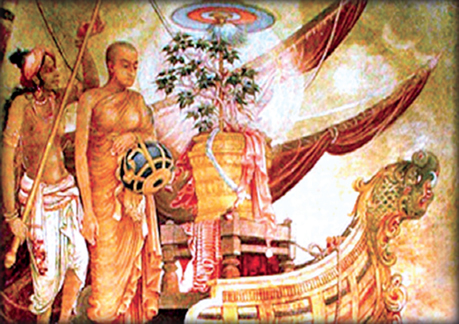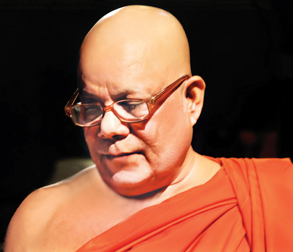Life unplugged
Foundation stone laid for first ever Pirivena for
Bhikkhunis:
By Husna Inayathullah
International Women’s Day had greater significance for the deeply
spiritual this year, with the first concrete step being taken to set up
a Pirivena for Bhikkhunis. The foundation stone for the monastic college
was laid at the Dekanduwala Buddhist Monastery in Horana on March 8,
marking it another new frontier in the tradition of Buddhist learning.
This would be the first monastic college for Bhikkhuni ordination to be
set up in the history of Buddhism in Sri Lanka.
 The architect of this ground breaking development is the Director,
Buddhist Cultural Centre, Ven. Kirama Wimalajothi Thera, who is also the
key person in the development of Bhikkhuni ordination in the Theravada
tradition. The architect of this ground breaking development is the Director,
Buddhist Cultural Centre, Ven. Kirama Wimalajothi Thera, who is also the
key person in the development of Bhikkhuni ordination in the Theravada
tradition.
Scriptures
Bhikkhunis are mainly found in Mahayana countries such as Korea,
Vietnam, China and Taiwan. According to Buddhist scriptures, the order
of Bhikkhunis was first created by the Buddha at the specific request of
his foster-mother Mahaprajapati Gotami, who became the first ordained
Bhikkhuni. The Buddha’s chief attendant, Ananda Thera, was also
instrumental in setting up the Bhikkhuni order, which spread to many
other countries over the years.
Buddhism was formally introduced to Sri Lanka by Arahat Mahinda, a
missionary sent by the Indian emperor Asoka during the reign of King
Devanmpiya Tissa (306–266 BCE). The Bhikkhuni order was subsequently
brought to the island from India by Arahat Sanghamitta Theri.
After a few centuries the Bhikkhuni order declined and it was never
re-established. Although there have been several attempts to revive it
due to opposition from a number of conservative senior Bhikkhus, there
has been little progress to date.
Explains Ven. Kirama Wimalajothi Thera: “In accordance with the
Buddhist culture, society consists of Bhikkhus, Bhikkhunis, Upasakas
(male devotees) and Upasikas (female devotees) and is based on their
inter-relationships. It is so constituted that it would at the end, may
be after many births, facilitate and culminate in the attainment of
Nirvana, the Summun Bonum for all who thus form a part of society.”
Structure
He claims the basic structure of society, mostly accepted as the
foundation of the Buddhist society, has by now come to a terrible
impasse. “It is rapidly degenerating and impaired in many ways. The
family, which is the basic unit of society, is itself faced with the
threat of being disintegrated. As a consequence we live in a society
that is mostly warped and perverted,” he says.
Ven. Wimalajothi Thera, who spent 20 years overseas as a Buddhist
missionary, started the Buddhist Cultural Centre in Dehiwala, with the
assistance of his devotees in Malaysia. Initially the Centre, which was
set up as a non-profit venture, promoted Buddhist publications alongside
other publications such as short stories, fiction, novels, and cartoons.
The Centre has up to now published more than 1,000 books in Sinhala and
English.
Though the intellectual development of the Buddhist had gained
ground, the development and welfare of Bhikkhunis had continued to
remain a neglected area since colonial times, even though monastic
educational centres for Bhikkus and schools and universities for
Buddhists were available.
“Bhikkhunis can do a yeoman service to society provided they are
given the requisite training in Buddhist scriptures, discipline and
psychological counselling. In Sri Lanka today, a Bhikkhuni hardly enjoys
the privileges taken for granted by women,” he says, pointing out that
they are barred from getting a reasonable and sufficient education that
befits their status. He is of the firm view that Bhikkhunis like Bhikkus
can be made useful to society by imparting to them the same skills that
are imparted to the Bhikkhus in monastic educational centres. “It is a
dire need of our time to enable them to do so,” he adds.
Ven. Wimalajothi Thera says, with the establishment of the new
Pirivena, Bhikkhunis would be given a thorough grounding in the
knowledge of the Tripitaka, languages such as Pali and English,
counselling skills and temple management. He elaborates: “Theory and
practice of meditation is also going to be taught. The proposed centre
will have residential facilities and classrooms with state of the art
equipment. The courses are not job-oriented with examinations held at
the end of training but they are intensely practical to meet real-life
situations.
 The
courses The
courses
are not
job-oriented
with
examinations
held at the end
of training but
they are
intensely
practical to
meet real-life
situations. |
“Traditional education provided in colleges and universities are
job-oriented with the result that Bhikkhus who pass out from such
institutions disrobe and return to lay-life. We intend to deviate
fundamentally from this attitude and give the Bhikkhunis real life
training. Clad in saffron robes they will be trained to lead a
monarchial life. The beneficiaries of this scheme of conferring ancient
Buddhist monastic training are not only Sri Lankan Bhikkhunis but also
those in the rest of the world.”
Pirivena
The new pirivena complex is estimated to cost around Rs.87.5 million.
Wimalajothi Thera says running cost will be somewhat high as
maintenance, payment of salaries for lectures, transport charges and
sanitary facilities will have to be factored in.
According to Theravada tradition, the Bhikkhuni order came into
existence five years after the Bick order. Buddhism is unique among
Indian religions in that the Buddha as the founder of a spiritual
tradition, explicitly states in the scriptures that a woman is as
capable of nirvana (enlightenment) as a man and can fully attain all
four stages of enlightenment in the Dhamma and Vinaya of the Buddha
Sasana. There is no equivalent in other traditions of the Therigatha or
Apadanas which record the high levels of spiritual attainment by women.
In a similar vein, major canonical Mahayana sutras such as the Lotus
sutra, chapter 12 records 6000 Bhikkhuni Arahats as receiving
predictions of Bodhisattvahood and future Buddhahood by the Buddha. In
Buddhism, women can openly aspire to and practice the highest level of
spiritual attainment. The opinion has been expressed that for a country
or nation to be considered as truly Buddhist, the majority of the nation
must be Buddhist and include at least a fourfold assembly of Bhikkhus,
Bhikkhunis, Upasakas and Upasikas.
Ven. Wimalajothi Thera says the setting up of the Pirivena would
provide women with the opportunity to receive ordination as well as to
study and teach the Dhamma. He laments the long neglect of women despite
Sri Lanka producing the first queen and the first women Prime Minister
in the world. He says his mission is to give equal status to Bhikkhus
and Bhikkhunis.
About 1000 Bhikkhunis are to be trained in the span of 10 to 12
years.
Any woman who is above 16 years can join the college with the consent
of her parents. Students will be selected after an interview. Those
selected will have to stay one year at the college wearing white and
observe the 10 percepts and then they will be tested as to whether they
will be qualified to be ordained. |

